 Everybody has a different opinion, but surely there are some models that stand head and shoulders above the rest. We like the Toshibas at…
Everybody has a different opinion, but surely there are some models that stand head and shoulders above the rest. We like the Toshibas at…
http://www.toshiba.com/us/ultrabooks_thin_and_light
They’re thin, light (you guessed that from the URL, right?), relatively affordable, and durable. They’re fast, packed with state-of-the-art static RAM hard drives (meaning — no moving parts) and the best connections available on the market (meaning — you won’t need to carry around adaptors). But the downside is — the batteries, with this kind of computer (“ultrabook”) are hard-wired into the chassis. When the battery wears out (somewhere around 1000 days from now?), you’ll likely have to replace it. If you’re comfortable with a three-year-life-span computer, then you’ll love these.
What’s YOUR favorite laptop? Mac users, so sorry we’re not Mac-savvy. But then, you don’t have as many brand names to choose from anyway, right? :-)












Dell Latitude E-series laptops can’t be beat for a business quality laptop. They are expensive, though.
Older models can be had for a very good price on Amazon, and are easily upgradeable with an SSD and newer faster ram.
You asked for the best, it’s the Mac or Apple. Sorry that you are not “Mac- savvy” you are missing the best. User friendly, updates are not a pain and a regular interruption. Few malware, bugs or viruses. Great customer services at the Apple Store genious bar. iPhone and iPad easy passing info. I have both an apple laptop and a windows laptop and when I retire I won’t be taking the windows with me even if it was offered.
I have been very happy with my Toshiba Portege and the original battery was great for a couple of years but the official replacement battery bought through Toshiba was terrible and now worse than my original one.
MacBook Pro
I’ve travelled to 60 nations as a missionary, and most missionaries I come across use Macs because though they require a larger initial investment, they are reliable for longer, and the risk of viruses and malware is minimal. Support is usually good too.
I would never use a mac on the field. Because of the high investment that may get stolen.
In evaluating laptops, it’s critical to differentiate between consumer-grade and business-grade machines. Of the major manufacturers, any of them have business-grade stuff that’s pretty good, and entry-level consumer-grade stuff that’s garbage. Brand name is no indicator of quality.
The problem is that for the specs that consumers are able to specify, the differences aren’t easily discernible. If you can get a machine with a 14 inch screen, 4 GB of RAM, an Intel i5 processor and 500 GB of hard drive at around $400, why should you pay twice that much?
For the business-grade machine, it’s true that you’ll get business-grade features that individuals typically don’t need, such as wake-on-lan, an ExpressCard port, a fingerprint reader, etc., but you often get better build quality, and better support, and a few features that are often useful, such as matte-finish displays, and the option for a pencil-eraser pointing stick (along with touch pad). This is especially important for laptops that spend a lot of time in their carry cases. The more a computer travels, the more abuse that it will get, and the more likely that it’s going to need service. And consumer-grade stuff usually isn’t going to get warranty coverage beyond three years, or international coverage.
Personally, I like Lenovo ThinkPad, and that’s the only line I’ve ever done repeat buys on. I’m on my third ThinkPad, and I’ve had no problems getting at least 4 years (and sometimes 5) as my primary working machine.
That said, I don’t think there’s problems in buying business-grade Dell Latitude, or HP EliteBook models. It’s been a while since I’ve seen Toshiba, but Tecron is their primary business-grade machine. I don’t have enough experience with Acer TravelMate, or ASUS’ highest-end machines, but they may be acceptable. Also, the highest-end Sony machines tend to be solid (although expensive), and the support for multi-media is a way of doing the kinds of things that are popular with mac, but doing it with Windows. Neither Sony nor ASUS differentiate between home and business lines, and you want to stay away from the low end.
If you want quality, stay away from consumer-grade lines: Dell Inspiron, HP Pavilion, Lenovo IdeaPad, Toshiba Satellite and Acer Aspire, as well as low-end Sony and ASUS models. Besides being designed for light-grade home use (and an emphasis on entertainment). Besides low-quality construction, and limits on support, consumer-grade machines are magnets for add-on software (lots of promotional stuff, and too frequently spyware and other garbage that is not only annoying, but often sucks system performance, and has issues of privacy and security) pre-installed. On the lowest end models, it’s not uncommon that nearly all of the retailer’s profit margin comes from third-party add-ons.
With business-grade computers, it’s also important to buy from retail channels that normally sell to business-grade users. Almost always, that means mail-order purchasing, and forget about walking into your local BigBox retailer (BestBuy, MicroCenter, Fry’s Electronics, etc, and walking out with a new computer. In brick-and-mortar stores, virtually all the stock is going to be consumer-grade stuff. The same applies to BigBox office supply chains, such as Staples and OfficeMax.
To get business-grade, you need to go to the business channels (i.e., “small and medium business”), and stay away from the consumer channels (“home and home office). Even if you’re running an office at home, you want “small business”, and not “home office”. Besides the major manufacturers, you can also look at the major business-oriented vendors. That would be CDW, Insight.com, PCConnection and zones.com. You can also get business-grade stuff at Tiger Direct, although they don’t differentiate between home and business channels. If you know what you’re doing, you can also get good deals at newegg.com
One thing that most retailers now do is to include a drill-down search tool that allows you to specify what you want, in the order that you want it. Thus, one of the things that I do is to go to either Insight or CDW, and use their tool to find a handful of similar models. Then I can take those quotes and shop those against similar offerings, from both the manufacturers and retailers. Since Tiger Direct and Newegg don’t differentiate between consumer and business, I generally don’t look at them until I have quotes from other sources on models that I *know* are business-grade.
We used Toshibas for many years and were happy with them. Last summer we bought Lenovos, and mine is a Yoga 2 Pro and I love it. It’s fast (solid state hard-drive), lightweight, and is a combination laptop/tablet that doesn’t come apart but folds into different stances.
I love having a touch screen and would never go back to not having one (maybe it’s not possible anyway!).
If you can’t afford the price for a new business class laptop, try the outlet stores on the major players sites.
Dell’s business outlet:
http://www.dell.com/us/dfb/p/?cs=28&c=us&l=en&s=dfb&redirect=1&dgc=IR&cid=259428&lid=4668286
Also, Amazon has refurbished and used laptops that are good values. I recently purchased an older model Dell Latitude from Amazon for about 1/5 the price of a new one. I upgraded the ram and the hard disk, and it is now a screaming fast machine with decent power and rugged construction.